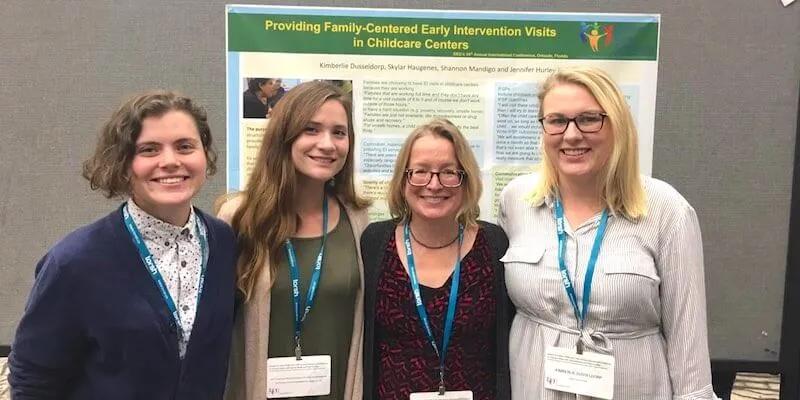Passionate and brimming with enthusiasm about her research and the services it helps provide for children with special needs, Jennifer Hurley is clearly in the right field.
“If I won the lottery, I would still come to work,” she laughs.
An Associate Professor in Early Childhood Special Education, Dr. Hurley has been teaching at the University of Vermont’s College of Education and Social Services for over ten years.
Continually engaged in various lines of research, Hurley is currently moving into the second phase of a study examining special education services for children ages birth to three and families who are experiencing homelessness across the country, assessing the national landscape in relation to eligibility determination and policies and practices for screening for services.
“We know that infants and toddlers who are experiencing homelessness are four times more likely to have a delay in development than the general population and we know that 50% of children who are homeless as infants and toddlers are later diagnosed with a developmental disability when they reach school age,” she explains. “Because homelessness is a condition with a high probability of resulting in a delay, it should count as an eligibility requirement for Part C [also known as Early Intervention, or EI] services.”
Collaborating with Carie Bires, policy manager on the Ounce of Prevention Fund in Chicago, IL, Hurley is hoping their work has a far-reaching impact, with the results affecting educational policies nationwide, and helping to mitigate the devastating impact of homelessness on young children.
This month, Hurley is presenting with three of her former undergraduate students at the Division for Early Childhood’s 34th Annual International Conference on Young Children with Disabilities in Orlando, FL, on “Providing Family-Centered Early Intervention Visits in Childcare Centers.”
With more and more parents working during the day and growing numbers of homeless children and parents in recovery, Hurley and 14 of her UVM undergraduate students studied the increasing frequency and impact of Early Intervention services being offered and implemented away from home, which has typically been the “natural environment” for young children. The qualitative study examined the challenges faced by 15 early interventionists and explored the innovative practices they employed in an effort to maintain a family-centered approach, documenting their struggles, triumphs, and input to help shape policy.
“A lot of the research I do is giving voice to the people doing the work, so that they can share what’s challenging about a unique situation and what they’ve found that works in a unique situation,” Hurley explains.
Hurley conducts the bulk of her research with her students, who she recognizes as her favorite part of UVM. “If you meet the students who are studying Early Intervention and Early Childhood Special Education—undergrads and grads—they’re all so wonderful, dedicated, bright and hardworking—it’s a treat.”
Additionally, most of Hurley’s studies are Vermont-based, but the work that’s done by Hurley and her students within the communities of Vermont doesn’t end with the conclusion of data collection. They present their work locally, providing free in-service and professional development, particularly in schools where people have participated in research—as a way of paying them back. Remarking that UVM’s Early Childhood Special Education program is “tightly wound into this community,” Hurley notes that she works closely with Children’s Integrated Services through the Department of Children and Families, as well as Danielle Howes, Director of Part C Services for the State of Vermont, and Katie McCarthy, the Early Childhood Special Education Coordinator for the Vermont Agency of Education.
Hurley’s most recent achievement is being awarded a $1.25 million grant from the U.S. Office of Special Education Programs through the Department of Education for the Interprofessional Education Project (IPE), an interdisciplinary preparation of master’s level candidates across the two disciplines of speech-language pathology and early intervention/early childhood special education leading to endorsement.
Collaborating with colleague Shelley Velleman, chair of the Department of Communication Sciences and Disorders in UVM’s College of Nursing and Health Sciences, and counseled by Howes and McCarthy (who are on the advisory board for the grant), Hurley will be working to provide funding for 34 candidates to complete their master’s degrees over the five years of the project. The IPE uses an intentional blending of two disciplines for a more holistic approach, bringing speech-language pathologists and early interventionists together to will learn to work with and learn from each other, early and often.
With the need for early childhood special educators predicted to grow 16% nationally by 2022, the grant will help address the chronic shortage of early intervention, early childhood special education, and speech-language pathology service providers.
“My goal is to get people into the University of Vermont who are already doing this work in the community and don’t have the resources to come to UVM and get the official master’s degree or endorsement […] People have told me ‘I want to come to school, but I can’t afford it’—now I have a list of names and I can reach out.”
